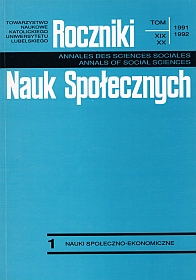Problem pracy w encyklikach papieskich. Od Rerum novarum LeonaXIII do Laborem exercens Jana Pawła II
Abstrakt
The author states that it was already Leon XIII who took labour in its subjective and objective sense. LeonXIII emphasized that every work has its value, and what is more, that „workers' labour is the only source of the state's well-being” (no 27). Pius XI in Quadragesimo anno has brought to focus the social (aside to the individual) character of labour. Labour cannot be treated as a commodity. For the first time the term „dignity of labour” is used in this encyclical. John XXIII in Mater et Magistra points out that labour is one of the socializing factors − the forming of social life, and that man has a natural right to work. On account of labour man is entitled to the right joint management of enterprise. According to the author Paul VI in Populorum progressio has laid stress on the creative character of labour. He has also shown the prevalence of human work over the other elements of economical life which bear only the character of tools. He emphasizes that the activity of Jesus Christ human labour has been raised to ultima-te dignity. John Paul II takes up this line of reasoning and makes it complete. Man through his work − says the pope − takes part not only in the work of creation but also in the work of Redemption and Resurrection of Christ. John Paul II has made eminent the subjective (personal) and objective character of human labour. Through work man, as it were, becomes more like man. It is in Laborem exercens that the pope has formulated his principle of priority of labour over capital.
The author writes that while talking about the changes und evolution in the popes' social teaching on human labour one should emphasizes the continuous character of the idea.
Copyright (c) 1992 Roczniki Nauk Społecznych

Utwór dostępny jest na licencji Creative Commons Uznanie autorstwa – Użycie niekomercyjne – Bez utworów zależnych 4.0 Międzynarodowe.


